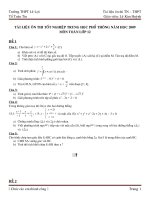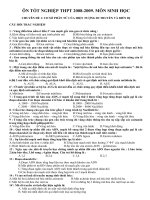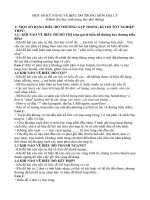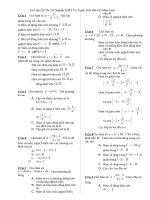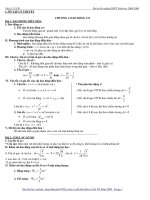Tải Đề ôn thi THPT Quốc Gia 2020 môn Anh có đáp án số 15 - Đề thi tốt nghiệp THPT 2020 môn tiếng Anh có đáp án
Bạn đang xem bản rút gọn của tài liệu. Xem và tải ngay bản đầy đủ của tài liệu tại đây (132.22 KB, 9 trang )
<span class='text_page_counter'>(1)</span><div class='page_container' data-page=1>
<b>ĐỀ THI THỬ THPTQG MÔN TIẾNG ANH</b>
<b>NĂM 2020 CÓ ĐÁP ÁN</b>
<b>I. Mark the letter A, B, C, or D on your answer sheet to indicate the word(s) OPPOSITE in</b>
<i><b>meaning to the underlined word(s) in each of the following questions. </b></i>
<b>Question 01. I threw his T-shirt back in his face, got back in my car, and drove home like a</b>
<i><b>bat out of hell, screaming the whole way.</b></i>
<b>A. very slowly </b> <b>B. very emotionally</b> <b>C. very carefully </b> <b>D. very speedily</b>
<b>Question 02. If you do not include a transcript of your academic record, your application will</b>
<i><b>be automatically rejected.</b></i>
<b>A. accepted </b> <b>B. opposed </b> <b>C. sent </b> <b>D. objected </b>
<b>II. </b><i><b>Read the following passage and mark the letter A, B, C, or D on your answer sheet to</b></i>
<i><b>indicate the correct answer to each of the questions.</b></i>
Laws are rules that a society makes to maintain order and keep citizens and their
possessions safe. Most countries have thousands of laws that are enforced by police officers
with the help of court systems.
Laws today are based on those of earlier societies. Ancient Egypt had laws in 3000 B.C.
They were based on common sense views of right and wrong. All people were equal under the
law. When a person broke the law, their punishment could be as simple as returning a stolen
<i><b>item or as severe as lashings from a whip. Sometimes, a person’s entire family could be</b></i>
punished for their crimes.
Later, there was the Code of Hammurabi from the land of Babylon. It was the first
written code of law in history and was created in 1772 B.C. It included 282 laws in total. This
is where we get the phrase, “an eye for an eye” as that was a punishment. There were laws
about rewards for returning slaves to owners, laws about marriage, laws about compensation
for theft and loss, and laws about responsibility if a house collapsed. These laws were
originally written on giant stone tablets. Some tablets still exist and are kept in the Louvre
Museum.
</div>
<span class='text_page_counter'>(2)</span><div class='page_container' data-page=2>
citizens interacted. That meant Romans focused on laws about property and possession. These
<i><b>laws were so well formed that they have affected lawyers ever since.</b></i>
Without these ancient examples, our modern laws would be very different. We have many
laws today, and new ones are still being created by governments. Sometimes, governments change
past laws as well. In the early 20th century, the government banned alcohol in the U.S. Later, the
government made alcohol legal and set a drinking age. This is just one example of how laws can
be changed.
<i>(Adapted from Subject Link 8 for Reading'')</i>
<b>Question 03. The word “they” in paragraph 4 refers to_________.</b>
<b>A. Roman laws </b> <b>B. Roman lawyers</b> <b>C. Roman citizens</b> <b>D. property and possession</b>
<b>Question 04. What can be inferred about the punishments for breaking laws in ancient Egypt?</b>
<b>A. They varied based on the law broken.</b>
<b>B. Stealing something was the most serious crime.</b>
<b>C. The punishment was chosen by the guilty person.</b>
<b>D. The family of the victim picked the punishment.</b>
<b>Question 05. The word entire in the passage is closest in meaning to_________.</b>
<b>A. whole</b> <b>B. limited </b> <b>C. possible</b> <b>D. huge</b>
<b>Question 06. Which is NOT true about ancient Roman laws?</b>
<b>A. Ancient Roman laws were not very concerned with property.</b>
<b>B. The Law of the Twelve Tables was the Romans’ first legal text.</b>
<b>C. Many laws were about how people interacted.</b>
<b>D. Modern lawyers are influenced by Roman laws.</b>
<b>Question 07. The main purpose of the second paragraph is to_________.</b>
<b>A. explain how laws were used in ancient Egypt. B. discuss how Egyptian laws were</b>
written.
<b>C. introduce Egyptian family laws.</b> <b>D. show which Egyptian laws still exist today.</b>
<b>Question 08. When was the Law of the Twelve Tables written?</b>
A. in the mid-5th century B.C. <b>B. in 1772 B.C. </b>
<b>C. before 3000 B.C.</b> <b>D. in the 20th century.</b>
<b>Question 09. Why does the author mention the law about banning alcohol in the U.S?</b>
A. to illustrate that laws can be made different.
</div>
<span class='text_page_counter'>(3)</span><div class='page_container' data-page=3>
<b>C. to confirm that drinking alcohol can be illegal. </b>
<b>D. to argue that laws can change drinking age.</b>
<b>Question 10. What is the passage mainly about?</b>
<b>A. how laws have changed since ancient times.</b>
<b>B. why today’s laws are the same as ancient laws.</b>
<b>C. how ancient punishments were better than modern punishments.</b>
<b>D. who wrote down laws in ancient Rome.</b>
<b>III. </b><i><b>Mark the letter A, B, C, or D on your answer sheet to indicate the sentence that is</b></i>
<i><b>closest in meaning to each of the following questions.</b></i>
<b>Question 11. “Be careful! The knife is sharp!” she shouted.</b>
<b>A. She told me to be careful as the knife was sharp.</b>
<b>B. Because the knife was sharp, she ordered me to be careful.</b>
<b>C. Because of the sharp knife, she shouted to me to be careful.</b>
<b>D. Being careful, she asked me if the knife was sharp.</b>
<b>Question 12. </b><i>I wish we had gone somewhere else for the holiday.</i>
<b>A. I regret not having gone somewhere else for the holiday.</b>
<b>B. If only we went somewhere else for the holiday.</b>
<b>C. If we had gone for a holiday, I would have gone somewhere else.</b>
<b>D. It's a pity we didn't go there for the holiday.</b>
<b>Question 13. </b><i>Large cities have fewer parks and green areas than small towns.</i>
<b>A. Large cities don’t have as many parks and green areas as small towns.</b>
<b>B. Small towns don’t have as many parks and greens areas as large cities.</b>
<b>C. Small town have more and more many parks and green areas.</b>
<b>D. The more parks large cities have, the more green areas small towns have.</b>
<b>IV. Mark the letter A, B, C, or D on your answer sheet to indicate the word that differs from</b>
<i><b>the other three in the position of primary stress in each of the following questions.</b></i>
<b>Question 14. A. accurate </b> <b>B. equality</b> <b>C. distinctive</b> <b>D. production</b>
<b>Question 15. A. appeal </b> <b>B. knowledge</b> <b>C. victim </b> <b>D. effort</b>
<b>V. </b><i><b>Mark the letter A, B, C, or D on your answer sheet to indicate the word whose</b></i>
<i><b>underlined part differs from the other three in pronunciation in each of the following</b></i>
<i><b>questions. </b></i>
</div>
<span class='text_page_counter'>(4)</span><div class='page_container' data-page=4>
<b>Question 17. A. maps</b> <b>B. worms</b> <b>C. swallows</b> <b>D. gazelles</b>
<b>VI. </b><i><b>Mark the letter A, B, C, or D on your answer sheet to indicate the option that best</b></i>
<i><b>completes each of the following exchanges. </b></i>
<b>Question 18. Mary is talking to a porter in the hotel lobby.</b>
<i><b>- Porter: “Shall I help you with your suitcase?” Mary: “___________, but I can </b></i>
manage.”
<b>A. That’s very kind of you </b> <b>B. I can’t agree more. </b>
<b>C. No, you can’t. </b> <b>D. What a pity!</b>
<b>Question 19. Monica and Mathew are talking about recycling.</b>
<i><b>- Monica: “I think we should recycle these bags. It will help protect the environment.” </b></i>
<i><b>- Mathew: “_________________”</b></i>
<b>A. I can't agree with you more. </b> <b>B. It's rubbish. We shouldn't use it.</b>
<b>C. You can't say that again.</b> <b>D. Never mind. </b>
<b>VII. Read the following passage and mark the letter A, B, C, or D on your answer sheet to</b>
<i><b>indicate the correct word or phrase that best fits each of the numbered blanks. </b></i>
Leisure activity isn’t just for fun, says a University of Florida psychologist who has
<b>developed a scale that (20)_________ hobbies based on needs they satisfy in people. The scale</b>
can help people find more personal fulfilment by giving them insight into what they really
like. “The surprising thing is that activities you might think are very different have similar
<b>effects on people,” said Howard E.A Tinsley, a UF psychology professor (21)_________</b>
developed the measurement. “Probably no one would consider acting to have the same
characteristics as roller-skating or playing baseball, but men and women who act as a hobby
report feeling an intense sense of belonging to a group, much the same way others do in
playing sports.”
</div>
<span class='text_page_counter'>(5)</span><div class='page_container' data-page=5>
self-expression like quilting or stamp collecting, because it gives people the opportunity to express
some aspect of their personality by doing something completely different from their daily
routine, he said.
<i> (Adapted from Vocabulary and Grammar for TOEFL IBT' by Ingrid Wisniewska)</i>
<b>Question 20. A. classifies </b> <b>B. separates </b> <b>C. splits</b> <b>D. divides </b>
<b>Question 21. A. who </b> <b>B. which </b> <b>C. whom </b> <b>D. what </b>
<b>Question 22. A. fulfil </b> <b>B. improve</b> <b>C. settle </b> <b>D. enjoy</b>
<b>Question 23. A. appeals </b> <b>B. attracts</b> <b>C. approaches</b> <b>D. appalls </b>
<b>Question 24. A. unexpected </b> <b>B. unexpectedly</b> <b>C. expectedly</b> <b>D. expected</b>
<b>VIII. Read the following passage and mark the letter A, B, C, or D on your answer sheet to</b>
<i><b>indicate the correct answer to each of the questions.</b></i>
Through our student work experience program, the education authority provides over
9,000 work experience placements for young people each year. Our program is designed to
offer employment opportunities for students that will enrich their academic studies and help
<i><b>them gain valuable work-related skills thereby improving their chances of finding a good job</b></i>
after graduation. A placement does not need to be related to a particular field of study and so
participants may even discover areas of work they have never considered before.
<i><b>All secondary and post-secondary school students in full-time education are eligible to</b></i>
apply for the program. Individual case managers will determine the minimum level of
academic achievement required for each job. During an academic term, a student may work
part-time. During the summer holiday a student may work full-time or part-time. The
education authority is responsible for the recruitment of all students under the work experience
program. Applicants apply in person to our office and we refer candidates to the appropriate
department.
Our internship program is designed specifically for post-secondary students, whether
part-time or full-time. Students on the internship program are given an assignment related to
their research area offering them the chance the placement of students under this program and
they will determine the duration of a work assignment. These traditionally last four months but
internship assignments may vary from 4 to 18 months. Students in this program normally work
full-time.
</div>
<span class='text_page_counter'>(6)</span><div class='page_container' data-page=6>
<b>Question 25. According to the passage, candidates can only join the internship </b>
program_________.
<b>A. if they have finished their secondary education. </b>
<b>B. if they have high academic results from their educational institution. </b>
<b>C. if they are a full-time student. </b>
<b>D. when they have graduated from university. </b>
<b>Question 26. What is the passage mainly about? </b>
<b>A. Work experience and internship programs. B. Part-time or full-time programs.</b>
<b>C. employment opportunities for post-secondary school students.</b>
<b>D. Valuable work-related skills and internship assignments. </b>
<b>Question 27. The word ''them'' in paragraph 1 refers to_________. </b>
<b>A. students</b> <b>B. academic studies C. opportunities </b> <b>D. experience placements</b>
<b>Question 28. According to the passage, through the program, participants are offered all of the</b>
following EXCEPT_________.
<b>A. valuable relationsB. educational studies C. job opportunities</b> <b>D. employable </b>
skills
<b>Question 29. The word ''eligible'' in paragraph 2 mostly means_________. </b>
<b>A. allowed</b> <b>B. required</b> <b>C. supposed </b> <b>D. obliged</b>
<b>IX. Mark the letter A, B, C, or D on your answer sheet to indicate the underlined part that</b>
<i><b>needs correction in each of the following questions.</b></i>
<b>Question 30. There are hundreds of applicants for that vacant position, but a few only are</b>
selected.
<b>A. a few only</b> <b>B. vacant</b> <b>C. There are</b> <b>D. hundreds of</b>
<b>Question 31. A considerate amount of time and effort must have been needed to provide such</b>
a good show.
<b>A. A considerate amount</b> <b>B. and effort</b> <b>C. good show</b> <b>D. been </b>
needed
<b>Question 32. Relations between fishermen and scientists supposed to be getting better before last</b>
week.
<b>A. scientists supposed</b> <b>B. better</b> <b>C. and </b> <b>D. between</b>
</div>
<span class='text_page_counter'>(7)</span><div class='page_container' data-page=7>
<b>Question 33. Glacial earthquakes do not cause much damage________ they are usually</b>
located in uninhabited areas.
<b>A. because</b> <b>B. in spite of</b> <b>C. although</b> <b>D. because of</b>
<b>Question 34. Zoos should try to re-create the animals’________ habitat rather than keeping them in</b>
cages.
<b>A. natural</b> <b>B. native</b> <b>C. naturalist</b> <b>D. nature </b>
<b>Question 35. After seeing a movie based on a novel, ________.</b>
<b>A. many people want to read the book </b> <b>B. the book made many people want to read it</b>
<b>C. the book was read by many people</b> <b>D. the reading of the book interests many </b>
people
<b>Question 36. Remember to appreciate what your friends do for you. You shouldn’t take</b>
them________.
<b>A. for granted </b> <b>B. out of habit</b> <b>C. as usual</b> <b>D. as a rule</b>
<b>Question 37. Harry’s new jacket doesn’t seem to fit him very well. He________ it on before he</b>
bought it.
<b>A. should have triedB. needn’t have tried </b> <b>C. must have tried</b> <b>D. might have tried</b>
<b>Question 38. Not until about a century after Julius Caesar landed in Britain________ actually conquer</b>
the island.
<b>A. did the Romans</b> <b>B. the Roman</b> <b>C. the Romans did</b> <b>D. Romans that</b>
<b>Question 39. By________ the household chores, he can help his mother after going home</b>
from school.
<b>A. doing</b> <b>B. making</b> <b>C. having</b> <b>D. ordering</b>
<b>Question 40. The tin opener seemed________ for left-hand people. </b>
<b>A. to be designed </b> <b>B. being designed</b> <b>C. to design</b> <b>D. designing</b>
<b>Question 41. I kept a journal about my trip while I________ in the United States. </b>
<b>A. was traveling</b> <b>B. have been traveling</b> <b>C. am traveling</b> <b>D. traveled </b>
<b>Question 42. I think the company should inform its customers________ the improvements in their</b>
services.
<b>A. about</b> <b>B. with</b> <b>C. on</b> <b>D. to</b>
<b>Question 43. The players were cheered by their________ as they came out of the pitch.</b>
</div>
<span class='text_page_counter'>(8)</span><div class='page_container' data-page=8>
<b>Question 44. It was________ easy for him to learn baseball because he had been a cricket </b>
player.
<b>A. relatively </b> <b>B. exceedingly</b> <b>C. normally</b> <b>D. purposefully </b>
<b>Question 45. If you hadn’t watched that late movie last night, you________ sleepy now.</b>
<b>A. wouldn’t be</b> <b>B. wouldn’t have been</b>
<b>C. might not have been</b> <b>D. would have been </b>
<b>Question 46. I knew at the time that it could not have been________ honest mistake but at</b>
Shirley's trial that was not the issue.
<b>A. an </b> <b>B. the </b> <b>C. Ø (no article) </b> <b>D. a</b>
<b>XI. Mark the letter A, B, C, or D on your answer sheet to indicate the word(s) CLOSEST in</b>
<i><b>meaning to the underlined word(s) in each of the following questions. </b></i>
<b>Question 47. It's a dog eat dog world out there and the young need the best qualifications they can</b>
get.
<b>A. fiercely competitive</b> <b>B. comparatively damaged</b>
<b>C. relatively harmful</b> <b>D. extremely serious</b>
<b>Question 48. A suit and tie is considered suitable dress for a job interview. Likewise, for</b>
<i><b>female applicants a pantsuit or dress with a jacket is appropriate.</b></i>
<b>A. acceptable</b> <b>B. satisfactory</b> <b>C. impolite</b> <b>D. casual</b>
<b>XII. </b><i><b>Mark the letter A, B, C, or D on your answer sheet to indicate the sentence that best</b></i>
<i><b>combines each pair of sentences in the following questions.</b></i>
<b>Question 49. </b><i>The film star wore dark glasses. She didn't want to be recognized in public.</i>
<b>A. The film star wore dark glasses to avoid being recognized in public.</b>
<b>B. The film star was not recognized in public because she wore dark glasses.</b>
<b>C. In spite of wearing dark glasses, the film star was recognized in public.</b>
<b>D. So as to be recognized in public, the film star wore dark glasses.</b>
<b>Question 50. </b><i>You’d better take the keys. It’s possible I’ll come home late.</i>
<b>A. You’d better take the keys in case I come home late.</b>
<b>B. If I come home late, you’d better take the keys.</b>
<b>C. You’d better take the keys as I possibly come home late.</b>
<b>D. I’ll probably come home late so that you’d better take the keys</b>
<b>ĐÁP ÁN</b>
</div>
<span class='text_page_counter'>(9)</span><div class='page_container' data-page=9></div>
<!--links-->
